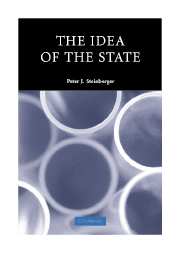3 - The Post-Kantian Convergence
Published online by Cambridge University Press: 22 September 2009
Summary
I have proposed a sharp distinction between prudential and philosophical argument – between theories of policy or government and the ontological or metaphysical theory of the state. But I have also observed what is, I think, undeniable, that a distinction does not necessarily imply a separation, and that, in the instant case, prudential or “political” claims unavoidably presuppose serious commitments of a philosophical or metaphysical nature. This fact will turn out to have decisive consequences for our understanding of the state as a structure of intelligibility. Before we can begin to think seriously about those consequences, however, we need to consider in more detail just what it might mean to pursue an ontological or metaphysical theory per se.
I have already briefly described (in 2.2 above) the sense in which certain canonical authors based their political recommendations on explicit or implicit metaphysical claims. I have also considered Hobbes's approach to metaphysical questions, have identified certain difficulties with his view, and have briefly sketched an alternative approach – an approach of the greatest importance that began to emerge in the latter part of the eighteenth century and that continues to be immensely influential today. It is, I think, a fact that older theories about how one actually does metaphysics – whether Platonic, Aristotelian or Hobbesian – have fallen into disrepute. But while many writers have concluded from this that metaphysical speculation per se is untenable, others have sought rather to place such speculation on an entirely new footing.
- Type
- Chapter
- Information
- The Idea of the State , pp. 94 - 146Publisher: Cambridge University PressPrint publication year: 2005

